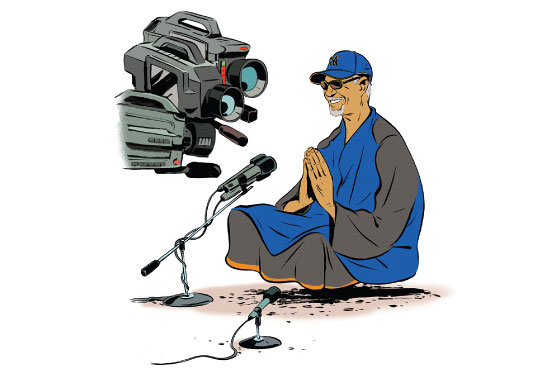
While Mets fans scream over the horrific possibility of the last game at Shea Stadium’s ending in yet another collapse, “interim” manager Jerry Manuel’s the one with the most on the line. If his team sneaks into the playoffs, Manuel very well might be named manager of the year. If they fall apart again, he’s likely out of a job. That won’t necessarily be his fault, but that’s the life of a manager.
So why is he so calm? My favorite Jerry Manuel story is the time he dressed up like a bellhop. In 2000, while manager of the Chicago White Sox, Manuel was suspended for eight games, forcing him to watch his Sox play from the team hotel. The team bus arrived, and it took a few minutes before a couple of players realized that the bellhop who was high-fiving them was actually their manager.
It’s the perfect Manuel moment: goofy, team-building, feisty, and, most of all, a self-aggrandizing, oft-retold example of his modern-day Casey Stengel Zen. Managing a baseball team is a job with high turnover and a rather small correlation between action and result. The best a manager can hope for is to focus the players’ attention squarely on the field. Manuel has decided that the best way to manage a team in New York is to take the media spotlight off his players, to make them forget they’re playing in New York. So he stepped up himself.
When Manuel was first hired, he did something you’d never see Joe Torre or Willie Randolph do: He went seeking the tabloids’ back pages. He jokingly compared Mets fans to “fertilizer” (Post headline: NEW MANAGER RIPS DUNG-HO MET FANS) and called himself a “gangster,” claiming he would “cut” Jose Reyes for insubordination. Everyone had fun.
Manuel’s shtick mesmerizes reporters, because most managers are dreadfully boring. Manuel cites as his greatest influences Martin Luther King Jr., Mahatma Gandhi, and Leo Tolstoy. It’s worth noting that, when questioned by a reporter, he admitted to not having read Anna Karenina.
Of course, it also puts the pressure on him. But Manuel didn’t suddenly become a terrible manager over the last fortnight, just as he wasn’t really a genius in the first place. Managers are hired to be fired, and the main job description is usually to be different from the previous guy. Manuel is here now because he’s not Willie Randolph.
Whether the Mets make the playoffs is going to come down to a few fleeting moments in a long season that, in the end, nobody can really control. It’ll be just one week. One week of a baseball season is a statistically insignificant period; the 1927 New York Yankees once lost four in a row. But in the shadow of another Mets implosion, the final six games mean everything, for all of them. If the Mets can sneak in and provide fans with any postseason games, regardless of their outcome, loyalists will forgive much of what has happened the last two autumns.
Manuel remains, in the midst of it, Manuel. When asked last week about the Mets’ horrifying, Billy Wagner–less bullpen, he grinned and uncorked a Stengelesque aphorism: “The bridge is all the way to the end, you know what I’m saying?” Well, not really. But as long as we let him, and the Mets need him to, he will keep talking. Had Manuel actually read Anna Karenina, he might know the famous quote, “All happy families are alike; each unhappy family is unhappy in its own way.” We are about to find out, in the next six days, which kind of family the Mets are.
Have good intel? Send tips to intel@nymag.com.
